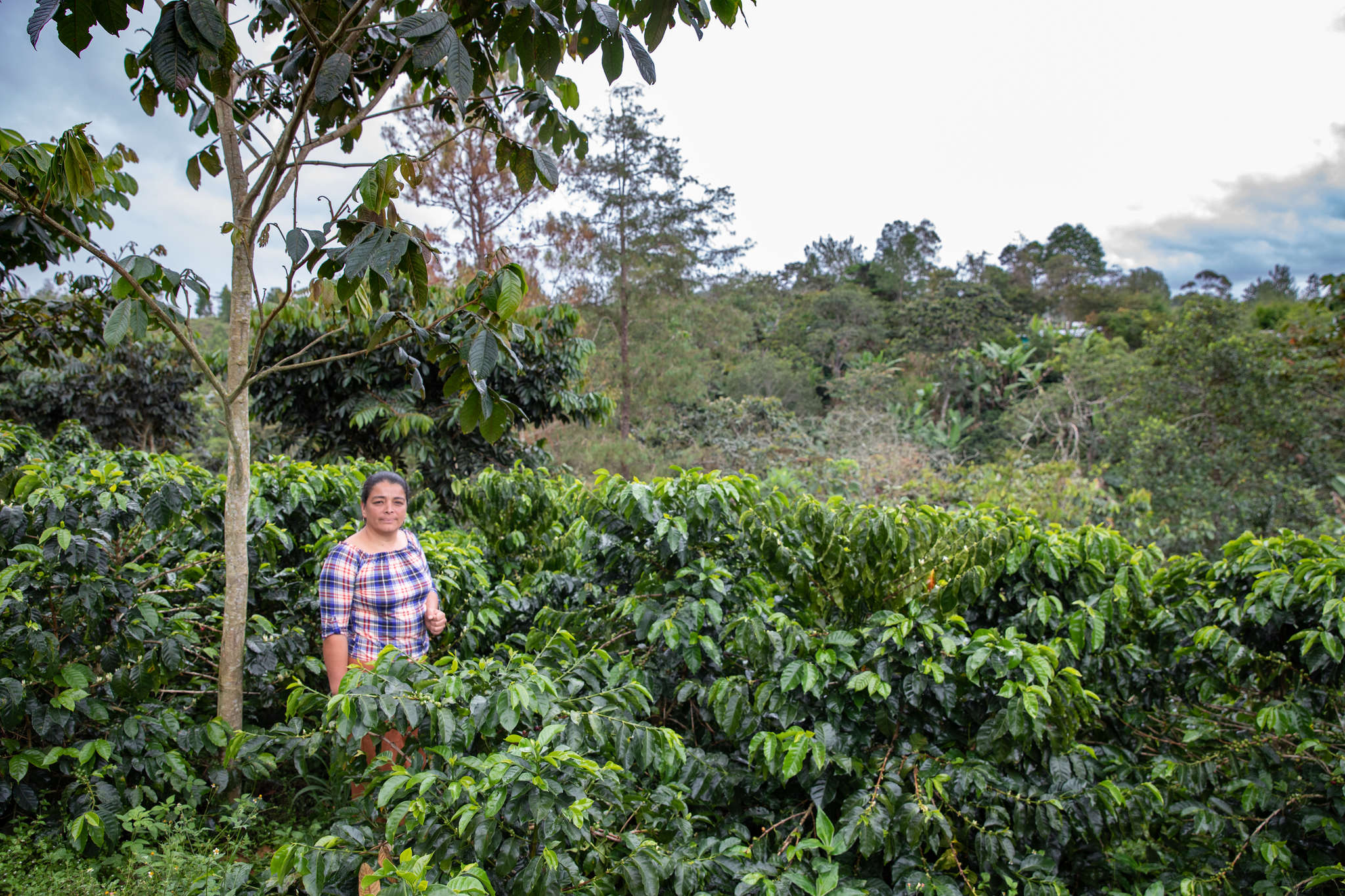Fish ponds bring hope to hard-working families
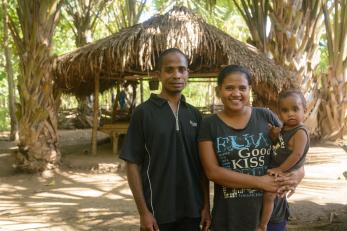
When you depend on the land, you depend on the weather, and farmers don’t like surprises. If the rainy season starts later than normal or before you’re expecting it, you’re likely to lose your entire crop. That’s what happened to Lino Gomes — but this year, he had a backup plan.
Lino is the father of three young girls, but he also supports his elderly mother, sister and her nine children. Growing enough food to keep a large family healthy in rural Timor-Leste is no easy feat. This year, when floods decimated Lino’s rice fields, he relied on his new fish pond to feed his family and bring in extra income.
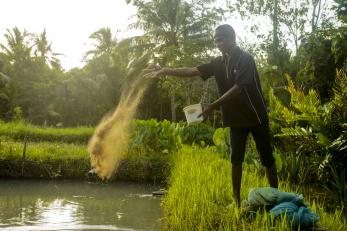
After learning to raise tilapia through a Mercy Corps program, Lino’s pond did so well this year that there were plenty of fish to cook at home and even enough to sell. But it took a series of struggles and several extremely tough years for Lino to make it this far.
Lino invited me to sit down and talk over cups of hot tea in his living room, almost bare except for red plastic chairs and family portraits on the mud-brick walls. His youngest daughter, Noviana, toddled over and Lino, 34, held her in his lap as he told me the story of the floods that washed through his fields.
“I was in the field when it started,” he said. “We had continuous rain, night and day, for 10 days. The water came down like a river, washing away all of my fields.”
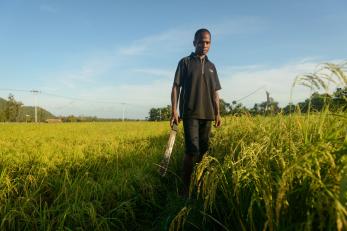
That afternoon we visited Lino’s fields — about 2.5 acres next to a river — to take a look. “We put whatever we could salvage on higher ground covered with a tarp. After the rain, we checked on it, but most of the rice and vegetables were already rotten.”
The family was devastated. Not only was their rice harvest lost, but their seed for next year rotted, too. Relatives helped out with the little bit of rice they had rescued from their own fields. “They understood our situation — that we needed to survive,” said Lino.
Lino’s wife, Olandina, showed me some of the rice that family members had given them, along with the rice she had bought to supplement it. The difference was stark: the bright white, long grains almost sparkled against the darkly-marbled, stubby local rice. It would never sell, but at least it provided a few decent meals.
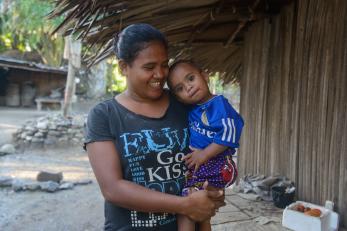
A farmer his whole life, Lino had noticed that rain patterns were changing. “We thought we planted in the right season, but lately the rain changes its periods. We don’t really understand it,” said Lino, still holding Noviana. “The rain comes at different times than in the old days, my grandparents' days.”
Practical and focused, he had been seeking an opportunity to earn a steadier income that would make the family more resilient when setbacks like a flooded rice crop put them at risk of hunger and malnutrition. Kids under five years old in Timor-Leste are the third most malnourished in the entire world, and protein is one of the key deficiencies.
"When I try something that has the potential to provide for my family," he said, "then I’ll continue working on it."
Lino dug a pond himself to try raising fish, but many died and few grew large enough to sell. So when he heard about Mercy Corps’ aquaculture training, he jumped at the opportunity to turn his languishing pond into the source of food and income he had hoped it would be.
The first lesson Lino learned: Tilapia is practically a miracle fish. It’s eaten by millions around the world, and while it existed in Timor-Leste, it had never become popular. Mercy Corps taught Lino all about tilapia’s special benefits:
- Tilapia thrive in small, static freshwater ponds like Lino’s. Despite being surrounded by the ocean, without refrigeration it’s nearly impossible to transport marine fish inland without it spoiling.
- Tilapia breed quickly and naturally, so there’s no need for families to rely on buying expensive baby fish from formal hatcheries.
- Tilapia eat basically anything, like coffee grounds, coconut fiber and even leftover rice hulls, which means that farmers can feed them for little to no cost.
Lino was sold. He followed Mercy Corps’ recommendation to dig his pond a bit larger, and received his first set of tilapia in 2011. This past year, his hard work paid off. When he lost all of his rice to the flood, his family lived off the income from the fish he sold.
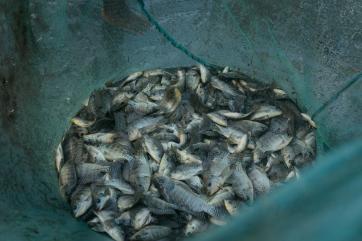
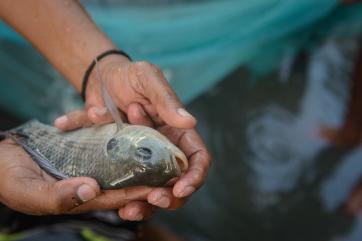
Lino’s wife, Olandina was overjoyed to have enough fish to put a fresh, protein-rich meal on the table for the kids, and to have income to pay for necessities like clothes and school fees.
This May, Lino earned $120 selling his extra fish to local restaurants and kiosks. When I asked Lino whether $120 each month was enough to support his family, his practical side shone through.
“It depends on how we manage it,” he said, reminding me that he often has to wait for the little fish to grow large enough to sell. “We look for ways to make it cover everything.”
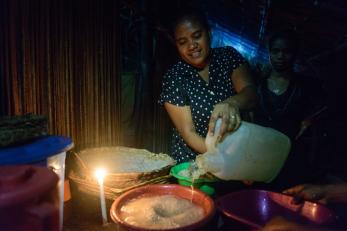
Since Mercy Corps trained the first set of 63 farmers in Timor-Leste, including Lino, tilapia ponds have taken off. Last year, Mercy Corps discovered that 140 farmers were raising fish in ponds, learning the tricks of the trade from their neighbors and even buying baby tilapia from each other to get started.
The fish farmers now have a more reliable source of income — the fish ponds bring a sense of relief and a renewed hope for families in rural Timor-Leste. With a successful year of fish farming behind him, Lino is starting to dream bigger.
“I would like to make our house larger to accommodate my sister. This is what I think about on a daily basis. But I’m by myself, so we’ll see what I earn from the harvest,” he said. “My dream is to have all of my children go to school.”
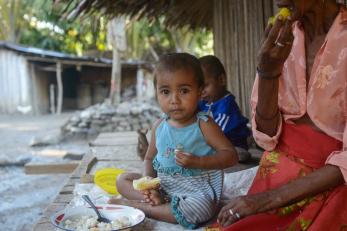
Mercy Corps is working in rural Timor-Leste to expand the fish training program to 1,500 farmers who will be able to start their own fish ponds like Lino's. Teaching farmers to raise tilapia is just one part of a larger Mercy Corps program focused on nutrition that reaches 30,000 people.
